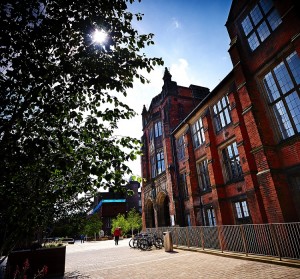In this blog series ‘Ideas for an Incoming Government’ Emeritus Professor John Goddard OBE, Centre for Urban and Regional Development Studies, Newcastle University, writes about the role universities play within their communities.
Many communities are facing difficult times in terms of slow growth, lack of jobs and entrenched poverty, but growing numbers now have links to one or more higher education institutions (HEIs). These can be ‘anchor institutions’, contributing to local job generation directly as an employer across a range of occupations and indirectly through new business formation, providing advice to existing businesses, attracting inward investment and developing skills in the local labour market. They also can contribute to social cohesion through work with the community and voluntary sectors, with schools in deprived neighbourhoods and within the cultural and creative sectors. HEIs, working alongside the local public and private sector, can play a key leadership role in local civil society. We define such institutions as civic universities or colleges, tackling societal challenges on a local as well as global level, such as poverty, health, environmental sustainability and demographic change.
What is the problem?
Unfortunately the national and international higher education market place within which HEIs operate does not incentivise them to operate in this way and their potential as anchor institutions may not be fully realised. For most universities the highest priority is position in the national and international league tables. These are strongly influenced by academic research ratings and student satisfaction scores. Community engagement is relegated to a ‘third mission’ after research and teaching – by definition an inferior position. Colleges may be more locally involved but are not incentivised to be part of a local higher education system complementing the work of universities. And within the rapidly evolving market place there may be financial winners and losers; some institutions will struggle to attract sufficient numbers of students, particularly full fee-paying overseas applicants. This could leave them vulnerable to bankruptcy, with insufficient resources from the Funding Council to provide assistance. This problem could be especially acute in smaller cities with a weaker economic base, highly dependent on the university as an anchor institution. In the future, regulation of this market must be sensitive to the contribution HEIs can make to meeting the needs of different places over and beyond the current focus solely on widening participation in higher education.
What is the solution?
To mobilise the full potential of HEIs we recommend a national fund is established, subscribed to from various central government departmental budgets to which HEIs wishing to be designated as civic institutions can have access. Such institutions should be required to introduce institution wide strategies for civic engagement embedded into teaching and research based on a self- assessment with the help of peers and partners. HEIs in receipt of this funding should have a civic university ‘contract’ with government defined in terms of delivery of local, national and international societal impacts.
In parallel, local authorities, LEPs and other centrally funded bodies such as Innovate UK and the Arts Council should be incentivised to establish formal partnership agreements with HEIs designed to underpin their role in local social, economic, cultural and environmental development. Central government should establish a cross-departmental group to monitor the impact of universities as anchor institutions in local communities arising from a wide range of non-geographically specific policies (e.g. science, culture, health, immigration, trade). The group should establish a national leadership programme to develop a cadre of people with the boundary spanning skills to work in this area.
There are a range of current national policies that contribute to this agenda, such as HEFCE’s Higher Education Innovation and Catalyst funds, Innovate UK’s Catapults and RCUK’s Beacons of Public Engagement, but these lack any geographical specificity. More, therefore, needs to be done to formalise the link between universities local business and civil society in order to address societal challenges on a regional and national level.
The evidence
The OECD has gathered extensive evidence based on 40 case studies of the link between HEIs and city and regional development summarised in its report Higher Education and Regions: Globally Competitive, Locally Engaged. This work has informed a new European Commission guide on Connecting Universities to Regional Growth, which in turn has influenced many member states in mobilising universities to contribute to the design and delivery of their national and regional smart specialisation strategies.
Until recently, the focus of evidence gathering has been on the contribution of HEIs to business development but a recent large scale survey by the UK’s Innovation Research Centre (led by Cambridge and Imperial College) has demonstrated that the bulk of academic engagement has been with a much wider range of interest groups in civil society.
This has been confirmed by a survey of the intended impact of academic research in six universities in three English cities, carried out for a book on The University and the City[1]. In- depth interviews for this book have revealed significant contributions of universities to urban challenges of environmental sustainability, public health and cultural vitality made possible by regional funding streams that no longer exist.
Recent analysis linking the potential vulnerability of universities in the higher education market place has revealed some institutions to be located in vulnerable places highly dependent on HE. But in all these studies it is clear that civic engagement is not fully recognised and rewarded. Such evidence is leading to a re-appraisal of the triple helix model of universities working exclusively with business and government and instead to propose a quadruple helix model which embraces civil society and social as well as technological innovation.
Notes to editors: The views stated are those of the author and do not necessarily reflect those of Newcastle University.
Further Information
Recent Publications:
Goddard, J. and Vallance, P. (2013) The University and the City, (Routledge, London)
Articles in refereed Journals:
- Goddard, J and Puukka, J. (2008) ‘The engagement of higher education institutions in regional development: an overview of the opportunities and challenges’ Higher Education Management and Policy 20, (2) p. 11-42
- Goddard, J., Vallance, P. and Puukka, J. (2011) ‘Experience of engagement between universities and cities: drivers and barriers in three European cities’, Built Environment 37, (3), p.299-316.
- Goddard, J., Robertson, D. and Vallance, P. (2012) ‘Universities, Technology and Innovation Centres, and regional development: the case of the North East of England’, Cambridge Journal of Economics 36, (3), p.609-627
- Goddard, J., Kempton, L. and Vallance, P. (2013) ‘Universities and Smart Specialisation: challenges, tensions, and opportunities for the innovation strategies of European regions’, Ekonomiaz 38, (2), p. 82-101.
- Goddard, J., Coombes, M., Kempton L. and Vallance, P (2014) ‘Universities as anchor institutions in cities in a turbulent funding environment: vulnerable institutions and vulnerable places in England’ Cambridge Journal of Regions Economy and Society 7 (2), p. 307-325
Official reports:
- Higher Education and Regions: Globally Competitive, Locally Engaged, OECD, Paris, 2007
- Connecting Universities to Regional Growth, European Commission, Brussels, 2011
- Guide to Research and Innovation Strategies for Smart Specialisation (RIS3), European Commission, Brussels, 2012
Book chapters:
- Goddard, J. and Vallance, P. (2011) ‘Universities and Regional Development’, in Pike, A., Rodríguez-Pose, A. and Tomaney, J. (eds.) Handbook of Local and Regional Development. (Routledge, London).
- Goddard, J., Kempton, L. and Vallance, P. (2013) ‘The Civic University: Connecting the Global and the Local’, in Olechnicka, A., Capello, R. and Gorzelak, G. (eds.) Universities, Cities and Regions. (Routledge, London).
- Goddard, J., Kempton,L. and Marlow, D. (2014) ‘LEPs, universities and Europe’ in Hardy, S. and Ward,M,.(eds.) Where next for local economic partnerships? Smith Institute, London
Research Reports:
- Goddard, J. Re-inventing the Civic University NESTA, London
- Goddard, J., Howlett., Vallance, P. and Kennie, T. ( 2010) Researching and Scoping a Higher Education and Civic Leadership Development Programme. Leadership Foundation for Higher Education, London
- Goddard, J., Burquel, N. and Kelly,U. (2012) Universities and Regional Innovation: a toolkit to assist with building collaborative partnerships. Final Report of the EU-Drivers for a Regional Innovation Platform, European Centre for the Strategic Management of Universities (ESMU), Brussels

